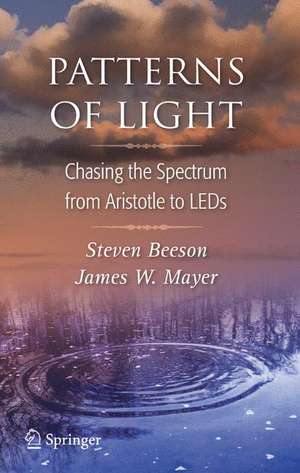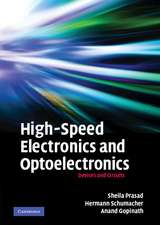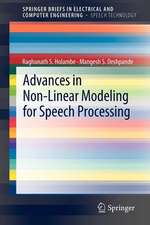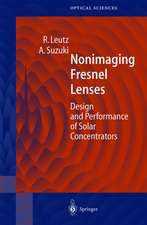Patterns of Light: Chasing the Spectrum from Aristotle to LEDs
Autor Steven Beeson, James W. Mayeren Limba Engleză Hardback – 2 ian 2008
| Toate formatele și edițiile | Preț | Express |
|---|---|---|
| Paperback (1) | 878.68 lei 38-44 zile | |
| Springer – 18 noi 2010 | 878.68 lei 38-44 zile | |
| Hardback (1) | 1108.36 lei 6-8 săpt. | |
| Springer – 2 ian 2008 | 1108.36 lei 6-8 săpt. |
Preț: 1108.36 lei
Preț vechi: 1351.65 lei
-18% Nou
Puncte Express: 1663
Preț estimativ în valută:
212.08€ • 222.03$ • 175.49£
212.08€ • 222.03$ • 175.49£
Carte tipărită la comandă
Livrare economică 05-19 aprilie
Preluare comenzi: 021 569.72.76
Specificații
ISBN-13: 9780387751061
ISBN-10: 0387751068
Pagini: 195
Ilustrații: XIV, 196 p. 100 illus. in color.
Dimensiuni: 155 x 235 x 18 mm
Greutate: 0.43 kg
Ediția:2008
Editura: Springer
Colecția Springer
Locul publicării:New York, NY, United States
ISBN-10: 0387751068
Pagini: 195
Ilustrații: XIV, 196 p. 100 illus. in color.
Dimensiuni: 155 x 235 x 18 mm
Greutate: 0.43 kg
Ediția:2008
Editura: Springer
Colecția Springer
Locul publicării:New York, NY, United States
Public țintă
ResearchCuprins
Introduction.- The Path of Light: Light beams, Light paths, Pinholes.- Reflection of Light: Mirrors, Daguerreotypes, Equal angles, Windows.- Refraction of Light: Speed of light, Waves, Refractive Index, Total internal reflection, Mirages.- Lenses: Focal length, Magnification, Photography, Fresnel lenses.- Color: Color and Light, The Eye and Color Sensation, Sources of Light, Composition of Light.- Rainbows: Your own rainbow, Secondary rainbows, Light inside, Double rainbows.- Blue skies and White clouds: Scattering, Rock candy/glass, Salt/sugar/foam, Water/ice.- Interference & Color: Soap bubbles, Oil/gas on water, Feathers.- Polarized light: Sunglasses, Blue sky.- The photon: a. Photoelectric effect, Solar panels, CCDs, LEDs.- Optical Spectroscopy: a. Light and electrons, Optical light emission, Prisms/gratings, Neon lights.- Electrons in atoms: Photons and electrons, X-rays, Optical absorption.- IR-UV-X-rays: Paintings in IR/UV/X-ray, Scorpions in UV, Suntans, Teeth in X-ray.- Optical and electron microscopy: Depth of focus, Images of Nature, Simple microscopes, Compound microscopes, SEM.- Mars.
Recenzii
From the reviews:
"In this work, which developed out of a general studies course at the university, Beeson and Mayer (both, Arizona State Univ.) present a descriptive overview of the nature of light and fundamental phenomena associated with its behavior. … The brief, nontechnical chapters are geared to the nonscientist and emphasize phenomena. The book includes excellent illustrations (with some color photos) and a glossary of terms. Summing Up: Recommended. General readers." (O. Eknoyan, CHOICE, Vol. 45 (11), 2008)
"In this work, which developed out of a general studies course at the university, Beeson and Mayer (both, Arizona State Univ.) present a descriptive overview of the nature of light and fundamental phenomena associated with its behavior. … The brief, nontechnical chapters are geared to the nonscientist and emphasize phenomena. The book includes excellent illustrations (with some color photos) and a glossary of terms. Summing Up: Recommended. General readers." (O. Eknoyan, CHOICE, Vol. 45 (11), 2008)
Textul de pe ultima copertă
Light is all around us – even when we do not see it. Our eyes do not detect the higher energy and shorter-than-visible-wavelength ultraviolet radiation, yet we know it is there from the sunburn we receive in Arizona. We know that window glass can block ultraviolet rays so we do not get a burn while driving with the windows rolled up. Our eyes do not detect the low-energy, long-wavelength infrared (IR) radiation but we know it exists from discussions of war applications and televised images of guided weapons targets. We also know about radio waves from the little boxes that talk to us and x-rays from the dentist's office.
Patterns of Light, Chasing the Spectrum from Aristotle to LEDs, written by Steve Beeson and Jim Mayer starts with the visible – the straight path of light. It continues with chapters detailing reflection (mirrors, storefront windows) and refraction (eyeglasses, binoculars). Color is then introduced with the query "Why is the sky blue?" After answering that and other similar questions ("Why is snow white?"), the book goes beyond the visible to the infrared and ultraviolet. Patterns of Light’s many colorful photos and figures further aid in the reader’s grasp of the concepts discussed.
Patterns of Light is a descriptive, rather than technical, book with the mathematics behind light included in the appendices. The book is designed for physics students of optics and engineering, but will certainly be enjoyed by all readers interested in gaining a broader perspective on light and its history.
Patterns of Light, Chasing the Spectrum from Aristotle to LEDs, written by Steve Beeson and Jim Mayer starts with the visible – the straight path of light. It continues with chapters detailing reflection (mirrors, storefront windows) and refraction (eyeglasses, binoculars). Color is then introduced with the query "Why is the sky blue?" After answering that and other similar questions ("Why is snow white?"), the book goes beyond the visible to the infrared and ultraviolet. Patterns of Light’s many colorful photos and figures further aid in the reader’s grasp of the concepts discussed.
Patterns of Light is a descriptive, rather than technical, book with the mathematics behind light included in the appendices. The book is designed for physics students of optics and engineering, but will certainly be enjoyed by all readers interested in gaining a broader perspective on light and its history.
Caracteristici
The book fills a void in the market by providing an overview of the entire electromagnetic spectrum, rather than just focusing on visible light Competing books are 20 years old; this book brings the topic up-to-date The book is observer-oriented with over 100 color photos as compared to decades-old texts which emphasize detailed treatments Includes supplementary material: sn.pub/extras











